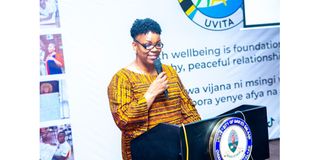Youth-led study seeks answers to social issues

The Deputy Permanent Secretary in the Ministry of Community Development, Gender, Women and Special Groups, Ms Felister Mdemu, addresses the delegation as she graces the launch of the Ustawi wa Vijana Tanzania (UVITA) project at the University of Dar es Salaam (UDSM).PHOTO/COURTESY
What you need to know:
- The three-year Ustawi wa Vijana Tanzania (UVITA) project is a collaboration between the University of Dar es Salaam (UDSM) and the UK’s University of Sussex. Uniquely, it places young Tanzanians aged 18–25 at the centre of the research process—not just as respondents but as facilitators and peer researchers.
Dar es Salaam. A new Sh1.31 billion research initiative is giving Tanzanian youth the opportunity to lead studies and develop solutions to issues affecting them, including emotional wellbeing and gender-based violence (GBV).
The three-year Ustawi wa Vijana Tanzania (UVITA) project is a collaboration between the University of Dar es Salaam (UDSM) and the UK’s University of Sussex. Uniquely, it places young Tanzanians aged 18–25 at the centre of the research process—not just as respondents but as facilitators and peer researchers.
“This project is a unique opportunity to centre young people’s voices in addressing mental health and GBV,” said the Principal Investigator from the University of Sussex, Dr Lyndsay Mclean, during the official launch in Dar es Salaam on August 6, 2025.
The research will be carried out in Wazo Hill (Kinondoni), Mbagala (Temeke) and at UDSM (Ubungo). It will explore how emotional wellbeing and relationship quality influence GBV among youth.
A co-Principal Investigator and senior UDSM researcher, Dr Richard Sambaiga said the project uses a contextually grounded, gender-transformative approach that includes storytelling, arts, therapy, and social media.
Deputy Permanent Secretary in the Ministry of Community Development, Gender, Women and Special Groups, Ms Felister Mdemu, said the project supports national goals, including the government’s 2029 target to eliminate violence against women and children.
“This initiative will improve young people’s health, education, relationships and economic empowerment,” she said, noting that youth are central to national development efforts.
Experts also hailed the model as a timely shift in research practice. “When young people lead, outcomes are more realistic and sustainable,” said Dr Joyce Mwilongo, a sociologist and development consultant. “What we need is not just more research—but more relevant research.”
Youth entrepreneur Nasra Ramadhan echoed that view, saying the initiative builds a more productive society. “If youth understand wellbeing and healthy relationships, they become better leaders, employees and entrepreneurs,” she said.
The UVITA project also involves key partners including Kijana Jasiri Resilience Organisation, Young and Alive Initiative, Tanzania Psychological Association, TAMWA, and several government ministries.
“When youth co-design research, we tap into their creativity and lived realities,” said Dr Sambaiga.





